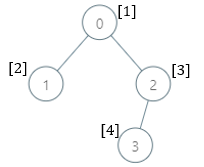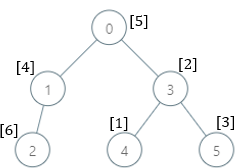Welcome to Subscribe On Youtube
2003. Smallest Missing Genetic Value in Each Subtree
Description
There is a family tree rooted at 0 consisting of n nodes numbered 0 to n - 1. You are given a 0-indexed integer array parents, where parents[i] is the parent for node i. Since node 0 is the root, parents[0] == -1.
There are 105 genetic values, each represented by an integer in the inclusive range [1, 105]. You are given a 0-indexed integer array nums, where nums[i] is a distinct genetic value for node i.
Return an array ans of length n where ans[i] is the smallest genetic value that is missing from the subtree rooted at node i.
The subtree rooted at a node x contains node x and all of its descendant nodes.
Example 1:

Input: parents = [-1,0,0,2], nums = [1,2,3,4] Output: [5,1,1,1] Explanation: The answer for each subtree is calculated as follows: - 0: The subtree contains nodes [0,1,2,3] with values [1,2,3,4]. 5 is the smallest missing value. - 1: The subtree contains only node 1 with value 2. 1 is the smallest missing value. - 2: The subtree contains nodes [2,3] with values [3,4]. 1 is the smallest missing value. - 3: The subtree contains only node 3 with value 4. 1 is the smallest missing value.
Example 2:

Input: parents = [-1,0,1,0,3,3], nums = [5,4,6,2,1,3] Output: [7,1,1,4,2,1] Explanation: The answer for each subtree is calculated as follows: - 0: The subtree contains nodes [0,1,2,3,4,5] with values [5,4,6,2,1,3]. 7 is the smallest missing value. - 1: The subtree contains nodes [1,2] with values [4,6]. 1 is the smallest missing value. - 2: The subtree contains only node 2 with value 6. 1 is the smallest missing value. - 3: The subtree contains nodes [3,4,5] with values [2,1,3]. 4 is the smallest missing value. - 4: The subtree contains only node 4 with value 1. 2 is the smallest missing value. - 5: The subtree contains only node 5 with value 3. 1 is the smallest missing value.
Example 3:
Input: parents = [-1,2,3,0,2,4,1], nums = [2,3,4,5,6,7,8] Output: [1,1,1,1,1,1,1] Explanation: The value 1 is missing from all the subtrees.
Constraints:
n == parents.length == nums.length2 <= n <= 1050 <= parents[i] <= n - 1fori != 0parents[0] == -1parentsrepresents a valid tree.1 <= nums[i] <= 105- Each
nums[i]is distinct.
Solutions
Solution 1: DFS
We notice that each node has a unique gene value, so we only need to find the node $idx$ with gene value $1$, and all nodes except for those on the path from node $idx$ to the root node $0$ have an answer of $1$.
Therefore, we initialize the answer array $ans$ to $[1,1,…,1]$, and our focus is on finding the answer for each node on the path from node $idx$ to the root node $0$.
We can start from node $idx$ and use depth-first search to mark the gene values that appear in the subtree rooted at $idx$, and record them in the array $has$. During the search process, we use an array $vis$ to mark the visited nodes to prevent repeated visits.
Next, we start from $i=2$ and keep looking for the first gene value that has not appeared, which is the answer for node $idx$. Here, $i$ is strictly increasing, because the gene values are unique, so we can always find a gene value that has not appeared in $[1,..n+1]$.
Then, we update the answer for node $idx$, i.e., $ans[idx]=i$, and update $idx$ to its parent node to continue the above process until $idx=-1$, which means we have reached the root node $0$.
Finally, we return the answer array $ans$.
The time complexity is $O(n)$, and the space complexity is $O(n)$. Here, $n$ is the number of nodes.
-
class Solution { private List<Integer>[] g; private boolean[] vis; private boolean[] has; private int[] nums; public int[] smallestMissingValueSubtree(int[] parents, int[] nums) { int n = nums.length; this.nums = nums; g = new List[n]; vis = new boolean[n]; has = new boolean[n + 2]; Arrays.setAll(g, i -> new ArrayList<>()); int idx = -1; for (int i = 0; i < n; ++i) { if (i > 0) { g[parents[i]].add(i); } if (nums[i] == 1) { idx = i; } } int[] ans = new int[n]; Arrays.fill(ans, 1); if (idx == -1) { return ans; } for (int i = 2; idx != -1; idx = parents[idx]) { dfs(idx); while (has[i]) { ++i; } ans[idx] = i; } return ans; } private void dfs(int i) { if (vis[i]) { return; } vis[i] = true; if (nums[i] < has.length) { has[nums[i]] = true; } for (int j : g[i]) { dfs(j); } } } -
class Solution { public: vector<int> smallestMissingValueSubtree(vector<int>& parents, vector<int>& nums) { int n = nums.size(); vector<int> g[n]; bool vis[n]; bool has[n + 2]; memset(vis, false, sizeof(vis)); memset(has, false, sizeof(has)); int idx = -1; for (int i = 0; i < n; ++i) { if (i) { g[parents[i]].push_back(i); } if (nums[i] == 1) { idx = i; } } vector<int> ans(n, 1); if (idx == -1) { return ans; } function<void(int)> dfs = [&](int i) { if (vis[i]) { return; } vis[i] = true; if (nums[i] < n + 2) { has[nums[i]] = true; } for (int j : g[i]) { dfs(j); } }; for (int i = 2; ~idx; idx = parents[idx]) { dfs(idx); while (has[i]) { ++i; } ans[idx] = i; } return ans; } }; -
class Solution: def smallestMissingValueSubtree( self, parents: List[int], nums: List[int] ) -> List[int]: def dfs(i: int): if vis[i]: return vis[i] = True if nums[i] < len(has): has[nums[i]] = True for j in g[i]: dfs(j) n = len(nums) ans = [1] * n g = [[] for _ in range(n)] idx = -1 for i, p in enumerate(parents): if i: g[p].append(i) if nums[i] == 1: idx = i if idx == -1: return ans vis = [False] * n has = [False] * (n + 2) i = 2 while idx != -1: dfs(idx) while has[i]: i += 1 ans[idx] = i idx = parents[idx] return ans -
func smallestMissingValueSubtree(parents []int, nums []int) []int { n := len(nums) g := make([][]int, n) vis := make([]bool, n) has := make([]bool, n+2) idx := -1 ans := make([]int, n) for i, p := range parents { if i > 0 { g[p] = append(g[p], i) } if nums[i] == 1 { idx = i } ans[i] = 1 } if idx < 0 { return ans } var dfs func(int) dfs = func(i int) { if vis[i] { return } vis[i] = true if nums[i] < len(has) { has[nums[i]] = true } for _, j := range g[i] { dfs(j) } } for i := 2; idx != -1; idx = parents[idx] { dfs(idx) for has[i] { i++ } ans[idx] = i } return ans } -
function smallestMissingValueSubtree(parents: number[], nums: number[]): number[] { const n = nums.length; const g: number[][] = Array.from({ length: n }, () => []); const vis: boolean[] = Array(n).fill(false); const has: boolean[] = Array(n + 2).fill(false); const ans: number[] = Array(n).fill(1); let idx = -1; for (let i = 0; i < n; ++i) { if (i) { g[parents[i]].push(i); } if (nums[i] === 1) { idx = i; } } if (idx === -1) { return ans; } const dfs = (i: number): void => { if (vis[i]) { return; } vis[i] = true; if (nums[i] < has.length) { has[nums[i]] = true; } for (const j of g[i]) { dfs(j); } }; for (let i = 2; ~idx; idx = parents[idx]) { dfs(idx); while (has[i]) { ++i; } ans[idx] = i; } return ans; } -
impl Solution { pub fn smallest_missing_value_subtree(parents: Vec<i32>, nums: Vec<i32>) -> Vec<i32> { fn dfs( i: usize, vis: &mut Vec<bool>, has: &mut Vec<bool>, g: &Vec<Vec<usize>>, nums: &Vec<i32> ) { if vis[i] { return; } vis[i] = true; if nums[i] < (has.len() as i32) { has[nums[i] as usize] = true; } for &j in &g[i] { dfs(j, vis, has, g, nums); } } let n = nums.len(); let mut ans = vec![1; n]; let mut g: Vec<Vec<usize>> = vec![vec![]; n]; let mut idx = -1; for (i, &p) in parents.iter().enumerate() { if i > 0 { g[p as usize].push(i); } if nums[i] == 1 { idx = i as i32; } } if idx == -1 { return ans; } let mut vis = vec![false; n]; let mut has = vec![false; (n + 2) as usize]; let mut i = 2; let mut idx_mut = idx; while idx_mut != -1 { dfs(idx_mut as usize, &mut vis, &mut has, &g, &nums); while has[i] { i += 1; } ans[idx_mut as usize] = i as i32; idx_mut = parents[idx_mut as usize]; } ans } }